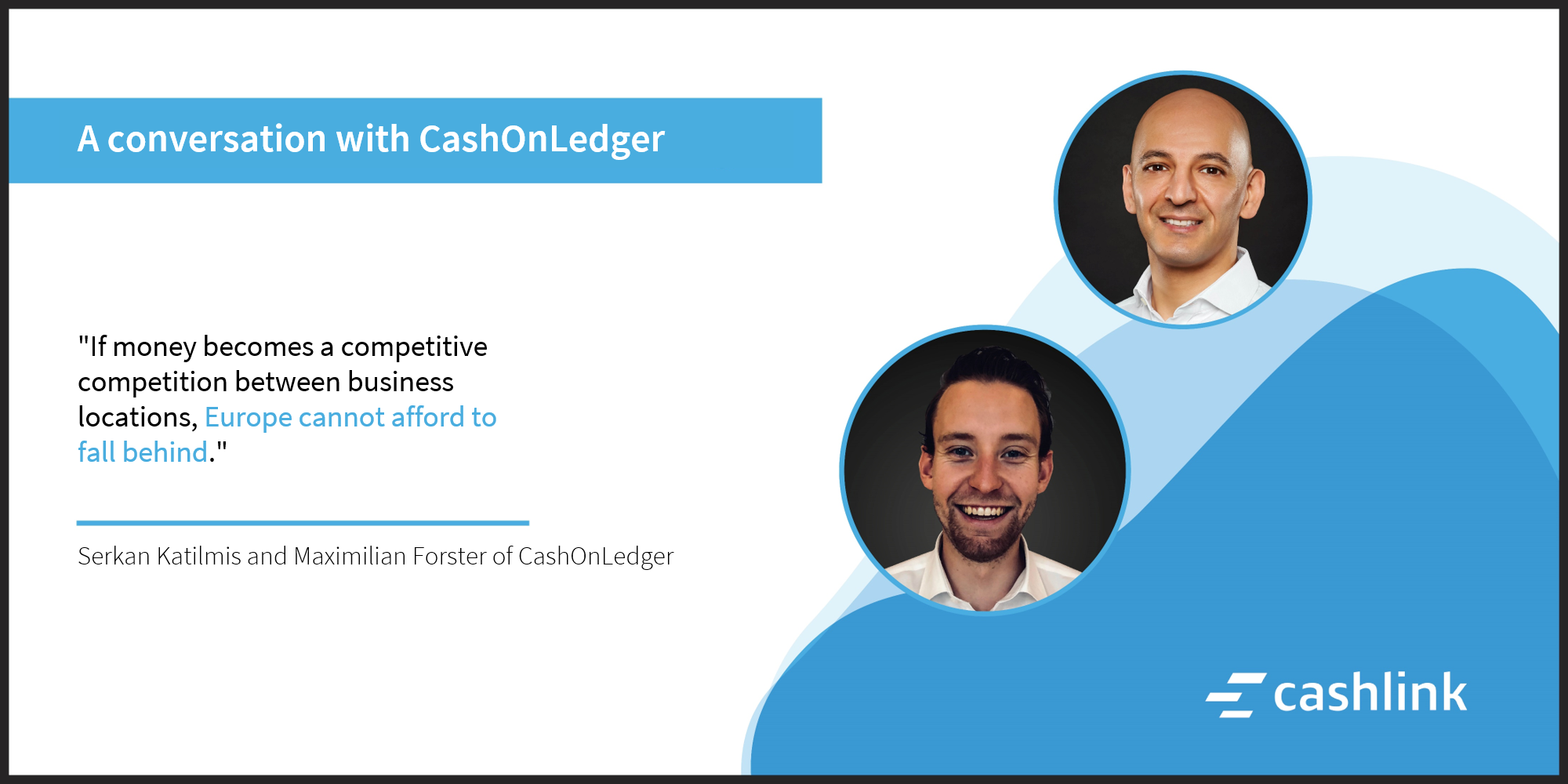
EXPERT INTERVIEW
E-money on the blockchain: A conversation with CashOnLedger


The financial world is under the sign of digitalization. Institutional players such as banks are also increasingly concerned with digitized payment methods, digital securities and new, disruptive technologies. According to the World Economic Forum, central banks are increasingly concerned with distributed ledger technology and its possible applications, for example, so-called Digital Central Bank Currencies (DCBD). After we announced our cooperation with CashOnLedger in March, we were very pleased to work with the two founders Serkan Katilmis and Maximilian Forster to talk about this topic, the effects, possible applications and the future of e-money.
Cashlink: Dear Serkan, dear Max, you are the founder of the start-up CashOnLedger. Please introduce yourself to our readers.
Serkan Katilmis: My name is Serkan Katilmis – I started my career at Goldman Sachs in Private Wealth Management and Investment Banking and worked as a management consultant for more than 20 years before founding CashOnLedger with Maximilian Forster. During this time, I have led several large digital transformation projects for well-known companies and have also driven several initiatives, including the rebuilding of Fokker Airport.
Maximilian Forster: I am Max Forster – in addition to my work at CashOnLedger, I am a co-founder of blockchain Bayern e.V., advisor to Fintech AG of the CDU Economic Council and blockchain AG at Bitkom e.V. Together with KPMG and Accenture, I previously built up the DLT and blockchain service offering and worked on the blockchain investment strategy for Picus Capital. As I am also closely connected to academic institutions, I am a guest speaker at the Technical University of Munich and have contributed to the ‘Digital Banking Handbook’ of the Goethe University Frankfurt.
Cashlink: Why do we need e-money on the blockchain and what impact does e-money have on digital securities?
Serkan: Digital money is already available through online banking. With CashOnLedger, we have decided to make the euro programmable using blockchain technology, thereby enabling new business models and creating process efficiencies for the existing financial market. Among other things, we are using the European Union’s e-money directive to ensure the efficient processing of securities transactions. The blockchain technology gives today’s financial market access to illiquid markets (keywords: real estate tokenization and tokenization of GmbH shares), whereas CashOnLedger enables settlement in FIAT currencies instead of crypto currencies by means of e-money.
Cashlink: How does the e-money on the blockchain work?
Max: E-money on the blockchain is currently created on the basis of commercial money. In concrete terms, this means that we are tokenizing the euro deposited in bank accounts, thus building a bridge between the existing financial market and the blockchain world. In the CashOnLedger model, the classic IBAN is linked to the wallet via a 1:1 relationship. This allows the movements of the classic financial world to be reflected on the blockchain & DLT wallet and vice versa.
Cashlink: What are classic applications of e-money on the blockchain?
Max: First and foremost, the blockchain and DLT infrastructure holds a lot of automation potential. In the concept of delivery versus payment alone, blockchain-based e-money enables less cost-intensive processing of securities trading by automating collective depositaries. Another concise use case is the integration of machines into payment transactions. This allows for usage-based accounting of machines, whereby the machines can then act as separate profit centers. This in turn enables the development of completely new business models in mechanical engineering.
Cashlink: Do you think there will be e-money issued by the central bank in the near future?
Serkan: By definition, there is no such thing as e-money at the central bank level, we are talking about Central Bank Digital Currencies (CBDC). There, in turn, a distinction must be made between retail CBDC (all citizens of a country receive access to programmable money) versus wholesale CBDC (commercial bank money, which enables interbank clearing of programmable money). There are several pilot projects in the western industrialized countries, with China already working on an implementation that is to go “live” this year. Money is thus becoming a competitive competition between business locations, although Europe must not lose its footing here. Accordingly, we are assuming that implementation will take place soon, although it is difficult to predict when this will take place at the present time.
Max: The fact is: with CashOnLedger, we are already enabling commercial banks to offer their customers the programmable and regulated euro on a blockchain basis.
Starten Sie Ihr eigenes Tokenisierungsprojekt
- Unverbindliche & kostenlose Erstberatung durch Experten
- Individuell an Ihre Bedürfnisse angepasste Lösung
- Digitalisierungsprojekte einfach, flexibel & transparent umsetzen

Haben Sie weitere Fragen zu unseren Produktpaketen?
Ich bin Michael, Co-Founder und CEO von Cashlink Technologies! Sollten Sie Fragen zu den einzelnen Produktpaketen haben, zögern Sie nicht und vereinbaren Sie gerne einen unverbindlichen Beratungstermin mit unserem Expertenteam – dieser sollte alle offenen Fragen klären!